We Ranked Steven Spielberg’s Dads From Bad To Worse
Happy fathers' day!

Back in the late-’90s, a good way to know you’d read the films of Steven Spielberg very closely was to rank how intensely you identified with Dawson Leery. Dawson’s Creek’s own floppy-haired Spielberg nut was uncomfortably familiar to 16-year-old Clem, who had spent many years watching and re-watching his back catalogue.
Consequently, as Dawson and any other Spielberg fans will tell you, I became aware very early on that a key hallmark of the director’s films is the father figure: absent, strained, symbolic, shambolic; dads are everywhere in the Spielberg oeuvre.
Critics and film theorists alike chalk this down to the teenaged Steven’s grappling with his parents’ divorce, for which he blamed his father, Arnold. He told 60 Minutes in 2012, “Even after I knew the truth, I blamed my dad. It’s still a mystery to me, but even though my mother was kind of like an older sister to me, I kind of put her up on a pedestal. And my dad was much more terrestrial, much more grounded, much more salt of the earth. And for some reason, it was easier for me to blame him than it was to someone who I already exalted.”
The director has long since reconciled with his father, which is reflected in (some of) his recent work, but in honour of Father’s Day, here are a few Spielberg Dads to make your own paternal relationship feel fine and dandy.
–
#7: Alan Grant — Jurassic Park (1993)
Spielberg loves to force parenthood upon an unwilling participant, and of all the director’s “instant fathers”, it was Sam Neill’s crotchety paleontologist who most willingly rose to the occasion, despite his vocal dislike of children (“They’re noisy, they’re messy, they’re expensive … They smell”).
How to go from “pretending to disembowel a child with a raptor claw” to “treetop family idyll complete with a Brachiosaur” in ten easy steps? Just throw in the threat of a variety of imminent and extremely painful deaths and Bob’s your uncle Alan’s your dad.
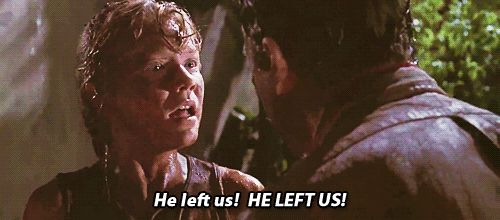
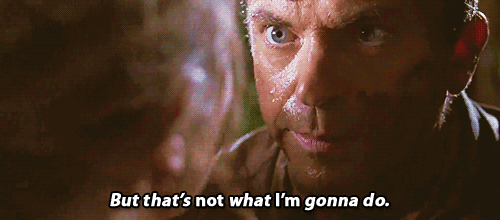
–
#6: Ted Naracott — War Horse (2011)
In War Horse, Spielberg did his best to pay homage to the ten-hankie horse weepies of the 1940s, like National Velvet. And, much like that film, in this World War I-set melodrama, it’s the mother who is really running things. After all, Peter Mullan’s Ted, a Boer War veteran with a drinking problem, puts the farm on a course to ruin when he buys an unsuitable colt at auction — for 30 guineas!! — rather than a work horse.
Although Joey manages to plough the field — becoming the best friend of young Albert (Jeremy Irvine) in the process — when rain destroys the crop, Ted secretly sells him to the army. Ted’s betrayal of Albert’s trust, all because of his failure as both a farmer and a father, sets the scene for a movie’s worth of life-threatening water-loss via the tear ducts (both the audience’s, and Irvine’s).
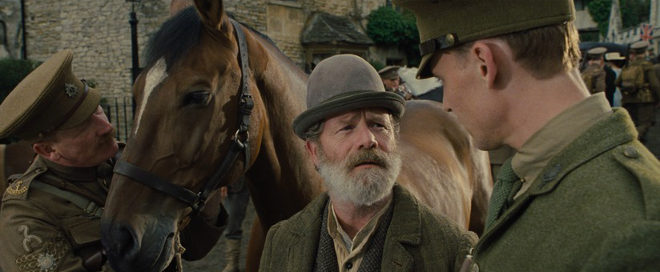
“The bad news is I’ve sold my son’s best friend. The good news is I’ve sold him to Tom Hiddleston. Tumblr is the real winner here.”
–
#5: Peter Banning — Hook (1991)
It’s true, Robin Williams’ Peter Banning eventually manages to remember how to be a good father, but a) it takes an extensive trip to Neverland (and much Bangaranging) to get his shit together, and b) damned if he isn’t one of the worst dads of all time before he takes the second star to the right and straight on til morning. He misses his son Jack’s baseball game, he breaks promises left right and centre, and he’s obsessed with his mobile phone. You know you’re losing the fatherhood Olympics when your own son feels as though Captain Hook is a better option.
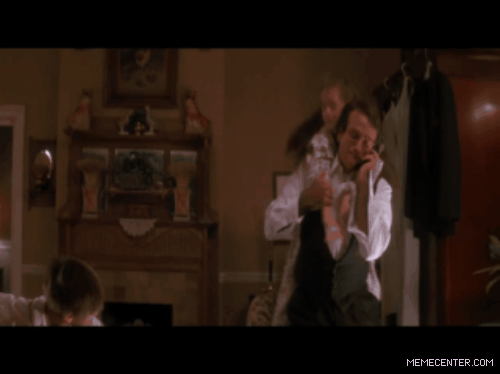
Peter Banning, Father of the Year.
–
#4: Basie — Empire Of The Sun (1987)
Spielberg’s adaptation of J.G. Ballard’s semi-autobiographical novel is a whole mess of family emotions. Technically it was Nigel Havers’ Dr. Rawlins who was the official father figure of Christian Bale’s Jamie during their time at Soochow Creek Internment Camp — but really it’s John Malkovich as Basie, the American sailor Jamie worships, who provides Jamie with both his ideal father figure (through games, dares, acts of heroism within the camp, and even giving him the nickname “Jim”) and, thus, his most devastating moment of abandonment: when Basie escapes the camp and, despite his earlier promises to the boy, doesn’t take Jamie with him.
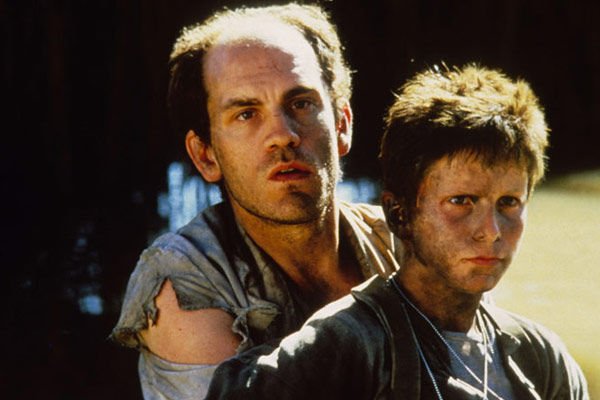
Basie ponders whether or not a Hershey Bar will be appropriate penance for his eventual abandonment of Jamie.
–
#3: Ray Ferrier — War Of The Worlds (2005)
Some have read Tom Cruise’s Ray as a “hero dad”, a character whose (eventual) derring do reflects Spielberg’s reconciliation with his own father. But when you think about it, Ray is busy doing as much to emotionally scar his kids as those damned alien tripods are.
The most affecting example of Ray’s failure as a dad comes when his daughter Rachel (Dakota Fanning) asks him to sing her a lullaby, and all he can come up with is the Beach Boys.
–
#2: Roy Neary — Close Encounters Of The Third Kind (1977)
“I guess you’ve noticed something a little strange with dad…”
Arguably the Spielberg dad whose behaviour most closely mirrors the director’s impression of his own father’s dereliction of duties, Roy Neary completely drops the ball on his parenting after he’s buzzed by a spaceship. Whether he’s building Devil’s Tower in mashed potato or having a nervous breakdown in the shower (the latter one of the most painful moments in Spielberg’s catalogue), Roy’s peacing out on fatherhood in favour of UFO-chasing is devastating to his children.
In a 1997 documentary about the film, Spielberg said, “I would never have made Close Encounters the way I made it in ’77, because I have a family that I would never leave. That was just the privilege of youth.” The two additional edits of the film, made in 1980 and ‘97, reflect Spielberg’s evolving judgment of Roy’s abandonment by fleshing out the scenes of family life: now we know what Roy has walked out on.
–
#1: Elliot’s father — E.T.: the Extra-Terrestrial (1982)
He’s not even in the movie! “He’s in Mexico with Sally!”
In E.T., possibly Spielberg’s saddest movie (on par only with A.I.), Elliot’s household is suffused with the sadness and anger caused by the abandonment of Elliot, Michael and Gertie by their unnamed, absent father, who has gone south of the border with his new girlfriend. In a psychoanalytical reading of the film, Gershon Reiter wrote, “E.T.’s abandonment ‘imagines’ what Elliot must have experienced, particularly as his introduction parallels the exposition. As Elliot’s mirror image, E. T. reflects what he must have felt. Both are left behind—E.T. by his mother ship, Elliot by his father.”
Happy Father’s Day!!
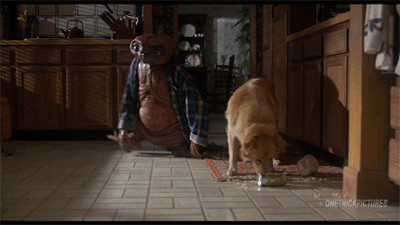
E.T. does his best impression of a deadbeat dad.
–
Clem Bastow is an award-winning writer and critic with a focus on popular culture, gender politics, mental health, and weird internet humour. She tweets from @clembastow

